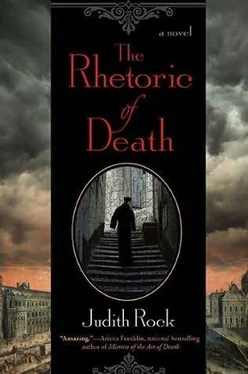Judith Rock - The Rhetoric of Death
Здесь есть возможность читать онлайн «Judith Rock - The Rhetoric of Death» весь текст электронной книги совершенно бесплатно (целиком полную версию без сокращений). В некоторых случаях можно слушать аудио, скачать через торрент в формате fb2 и присутствует краткое содержание. Жанр: Исторический детектив, на английском языке. Описание произведения, (предисловие) а так же отзывы посетителей доступны на портале библиотеки ЛибКат.
- Название:The Rhetoric of Death
- Автор:
- Жанр:
- Год:неизвестен
- ISBN:нет данных
- Рейтинг книги:3 / 5. Голосов: 1
-
Избранное:Добавить в избранное
- Отзывы:
-
Ваша оценка:
- 60
- 1
- 2
- 3
- 4
- 5
The Rhetoric of Death: краткое содержание, описание и аннотация
Предлагаем к чтению аннотацию, описание, краткое содержание или предисловие (зависит от того, что написал сам автор книги «The Rhetoric of Death»). Если вы не нашли необходимую информацию о книге — напишите в комментариях, мы постараемся отыскать её.
The Rhetoric of Death — читать онлайн бесплатно полную книгу (весь текст) целиком
Ниже представлен текст книги, разбитый по страницам. Система сохранения места последней прочитанной страницы, позволяет с удобством читать онлайн бесплатно книгу «The Rhetoric of Death», без необходимости каждый раз заново искать на чём Вы остановились. Поставьте закладку, и сможете в любой момент перейти на страницу, на которой закончили чтение.
Интервал:
Закладка:
A small boy hurtled around the rose hedge and stopped, staring wide-eyed at Charles.
“Yes, mon brave,” Charles said wearily, “I am covered in shit. And no, you cannot come in. Piss somewhere else, please.”
“But, maitre-”
“Somewhere else. Please. Go.”
The boy backed hurriedly away, his blue eyes growing even larger as Jouvancy, Le Picart, and two lay brothers carrying blankets came around the hedge. The rector watched the little boy stumble hastily toward a corner of the courtyard, still staring over his shoulder. Shaking his head, Le Picart motioned to the brothers to wait and went into the latrine with Charles and Jouvancy. Le Picart’s eyes were wintry pools of sorrow as he signed a cross over Philippe’s body. He turned to Jouvancy.
“I am so sorry, mon pere. So very sorry.” Ignoring the filth, he put an arm around Jouvancy’s bowed shoulders. “We will take him to the washing room. Below the infirmary,” he explained to Charles, “where we occasionally have to prepare bodies for burial-though we have no cemetery here, of course.” He gave Charles a long, unreadable look. “Maitre du Luc, when the body is clean, I want you to examine it. You were a soldier, you have seen violent death more often than most of us.”
He led Charles and Jouvancy outside, where they waited for the lay brothers to wrap Philippe in the blankets they carried and bear him away.
“Will you search, please, Maitre du Luc,” the rector said, when the body was gone, “for anything in the latrine that seems out of place? It has been too many days, but we must try.”
Trying to breathe as little as need be, Charles made his way slowly along the line of seats, scrutinizing the bench and the dirt floor, finding only leaves and grass tracked in from outside and bits of straw from the braided bundles for cleaning oneself that were kept in a wooden bucket beside the door. Eyes still on the ground, he retraced his steps to the corner where he’d found Philippe. As he stood there, staring at the floor and thinking about the yellow shirt and the hands that had shoved him to the ground, his eyes suddenly focused on what they were seeing. With the toe of his shoe he edged a clump of loose broken straw out of the corner and bent to look more closely at it. Its pieces were longer than the pieces that broke off the braided bundles. He picked up his find with his fingertips, sniffed cautiously at it, and carried it outside.
“Pere Le Picart, this isn’t from a straw bundle for cleaning. It seems to be a clump of stable straw, with traces of horse dung. Do students keep horses in our stable? Would they track this kind of straw into the latrine?”
The rector’s eyebrows rose and Jouvancy wiped his eyes and looked at what Charles held.
“No,” Le Picart said, “our stable is very small. We keep only our own few horses there.”
“Does anyone from the college keep horses nearby?”
“Some of the older students do, mostly at the houses of family. Why would this clump of straw matter?”
“It was in the corner beside the hole where I found Philippe. I wonder how it got there.”
Le Picart shrugged dismissively. “The stables are in the next courtyard and this is the nearest latrine. You found nothing else?” When Charles shook his head, Le Picart said, “Go and clean yourselves quickly, both of you, then come to me in the washing room.” He looked at them ruefully. “You may have to bathe. But at least the day is warm.” Although Jesuit colleges had a reputation for cleanliness, and students were expected to change their shirts every week or so since wearing clean linen was known to keep the body clean, bathing was infrequent and usually regarded with suspicion. Le Picart went the way the brothers had gone with their burden and Jouvancy turned to Charles.
“To the laundry,” he said, steadied by having something mundane to do. “They won’t be happy about it, but they’ll give us a tub of hot water. The only other tubs are the one they’ll use for Philippe-” His voice faltered. He cleared his throat and rushed on, “And the one in the infirmary. But if we go into Frere Brunet’s domain like this, he will slay us.” He looked distastefully at his filthy hands. “Some people say filth makes you ill. I hope not, because if we should be ill from this, Frere Brunet will make us bathe again.”
“My mother forced us all into a tub every month or so, winter and summer,” Charles said, glad to ease the moment with trivial talk.
“Really! Even though water can soak through the skin and harm the organs? You are not jesting? Well, I must say, bathing does not seem to have harmed you. But there, things are changing, after all. These new lenses-microscopes, I mean-do raise interesting questions. Some years ago, in Germany, our brilliant Father Athanasius Kircher-you know his work, of course-said he saw a little worm in the blood of plague victims that was not there in the blood of healthy people. Some people think the worm generates in dirt and causes plague. I am not so sure, but I did look through a lens once.”
“What did you see?”
“Little wriggling things like Pere Kircher’s worm. I was astonished! And do you know what it made me wonder? Whether we might someday make a lens that allows us to see God! I don’t mean any blasphemy, but-if a lens lets us see these things too small for the eye alone, then perhaps, on the other end of the scale, so to speak
…”
Jouvancy talked on, pouring the balm of words over his raw shock and grief, and Charles found himself thinking of a young marquis who’d kept him from bleeding to death when he’d been wounded in the Spanish Netherlands, in the battle of St. Omer. The boy had stripped off his own shirt, rolled it into a ball, and held it against Charles’s mangled shoulder, talking knowledge-ably and desperately about wine while Charles’s blood soaked into the linen and the cart picking up the wounded inched toward them.
The lay brothers in the laundry were as little pleased as Jouvancy had said they would be, but they parted with a tub of just-heated water, provided towels, and fetched them clean clothes. Half an hour later, feeling unpleasantly boiled and with water still dripping from their hair, Jouvancy and Charles joined the rector in the room behind the infirmarian’s workshop. Philippe’s body, stripped and washed, lay on a long table. Now that the body was clean, its youth was even more heartbreaking. Steeling himself, Charles picked up one of Philippe’s hands to look for signs of a fight. He found no marks at all on the hands, but the one sign he did find on the body was definitive. The deeply incised mark around Philippe’s neck told them beyond doubt that the boy had been strangled. But the mark was oddly varied-several-stranded at the sides and patterned-braided, perhaps-at the throat. With aching tenderness, Jouvancy folded the boy’s slender, unlined hands over his chest and pulled the shroud up over him.
His voice shook as he said, “Do you think he was in the latrine all this time?”
“Most likely,” Charles said. “The death stiffness has come and gone, and decay looks well advanced. Because of the heat in-in the latrine.”
“At least we know now how he was killed. But I would have had the killer use some other means,” Le Picart said.
Charles and Jouvancy looked at him in surprise. Then Charles began to nod, but Jouvancy blinked in confusion. “Why?”
“If he had been killed with an obvious weapon,” Le Picart said gently, “finding the killer would be easier. Since we forbid all weapons here, a dagger or sword or pistol might be traced to its owner that much more easily. But strangled-every one of us wears something in his clothing that could be woven with other pieces to leave a mark like this.”
Читать дальшеИнтервал:
Закладка:
Похожие книги на «The Rhetoric of Death»
Представляем Вашему вниманию похожие книги на «The Rhetoric of Death» списком для выбора. Мы отобрали схожую по названию и смыслу литературу в надежде предоставить читателям больше вариантов отыскать новые, интересные, ещё непрочитанные произведения.
Обсуждение, отзывы о книге «The Rhetoric of Death» и просто собственные мнения читателей. Оставьте ваши комментарии, напишите, что Вы думаете о произведении, его смысле или главных героях. Укажите что конкретно понравилось, а что нет, и почему Вы так считаете.












